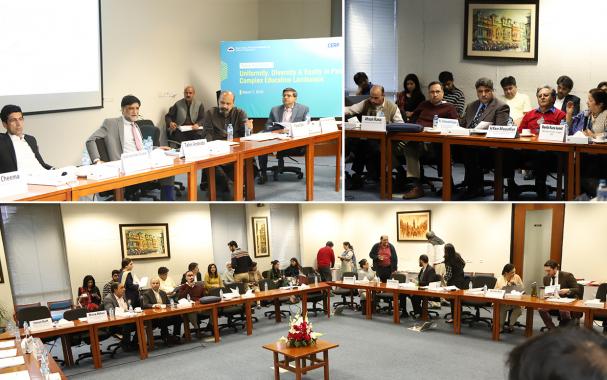
The policy roundtable ‘Uniformity, Diversity and Equity in Pakistan’s Complex Education Landscape’, was organised on March 7, 2019 by the LUMS Syed Ahsan Ali & Syed Maratib Ali School of Education (SOE) and the Centre for Economic Research in Pakistan (CERP). The event provided a timely opportunity for academics, policymakers, and stakeholders from the public and private sectors to deliberate together on achieving the goal of a uniform system of education
The event was attended by notable personnel from the public sector including Shahram Khan Tarakai, Provincial Minister KP Local Government, Elections and Rural Development, Saif Anjum, Secretary Local Government and Community Development – Govt of Punjab, Muhammad Mahmood, Secretary School Education Department – Govt of Punjab, Jahanzeb Awan, Special Secretary School Education P&D Reforms – Govt of Pakistan, Irfan Muzaffar, Team Leader – Punjab Education Sector programme, and Asif Farrukh, Project Director – PESRP. From the private sector, Baela Raza Jamil, CEO , Idara-e-Talim-o-Agahi, Riaz Kamlani, Vice President Outcomes, The Citizens Foundation, Kasim Kasuri, CEO, Beaconhouse School System, and Seema Aziz, Chairperson, CARE Foundation, were in attendance, among others. Consultants including Saima Anwer, Education Advisor, DFID, James O’Donoghue, Education Advisor, DFID, and Soufia Siddiqi, Consultant Team Lead, SMU, also joined the discussion.
The important features highlighted at the event included:
• The dramatic growth in urban population between the 1998 and the 2017 population censuses and a third of Pakistan population now living in “quasi urban like“ rural areas of Pakistan.
• Rising aspirations of economic and social mobility in all segments of Pakistan society resulting in i) an increased willingness to pay for education and ii) a diversity of for-profit and not-for-profit education providers
• The challenges to existing governance and delivery models coming from the prevailing educational environment that leaves millions of children out of school and delivers demonstrably system wide low levels of learning.
• The constrained public fiscal space resulting in limited financial degrees of freedom to meet these challenges as exemplified by the reduced public footprint in urban areas.
The policy roundtable comprised of two panels, moderated by Dr. Faisal Bari and Dr. Ali Cheema respectively.
Dr. Bari’s panel discussed how the interaction between the aspiration for uniformity and the reality of diversity addresses the objective of equality of access and quality of education without producing tensions across the disparate education systems in Pakistan. Questions and concerns produced in the panel were tackled in light of examples of experiences based on Pakistan’s empirical reality and from uniform education systems in the global context.
Dr. Cheema’s panel examined the question of ‘How to do Education Delivery in Pakistan's Decentralising Context? The aim of the panel was to work together to define a framework for decentralising education that unbundles education into constituent functions or activities and various jurisdictions for service delivery, adopts principles that can be used to assign the matrix of unbundled functions and activities across the different jurisdictions and suggests principles of financial devolution that will be required to achieve an optimal assignment.
The roundtable is the first in a series aimed to build new, productive synergies between researchers, practitioners and policymakers for conceptualisation and implementation of the education reform agenda. It intends to develop policy-research collaborations in a way that will feed into all stages of the evidence-to-policy chain to articulate and resolve issues in education through an effective and coherent framework for reform.








